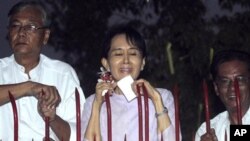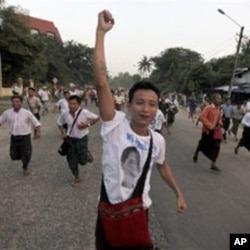This is a special report from a journalist inside Rangoon, who has been covering Burma's political developments for VOA despite the threat of deportation. The journalist's identity is being withheld so that they may continue reporting. We bring you their notes from the field.
On Saturday evening in Rangoon, Aung San Suu Kyi peered over the top of the gate that has separated her from the rest of Burma for the past seven years.
"It's been so long since I've seen the people," she said to hundreds, if not thousands, of cheering supporters. "I won't say more now, because you can't hear what I'm saying, but I will hold a speech with a loudspeaker tomorrow at the NLD office."
The pushing crowd, which had been crying and sweating, was charmed and let out a collective laugh as they caught their first glimpse of the pro-democracy leader. Dressed in t-shirts bearing Aung San Suu Kyi's image, her supporters held cameras and phones in the air to record the moment, chanting her name and singing the theme song of the National League for Democracy.
It was a highly emotional day for so many people of Burma. The road in front of Aung San Suu Kyi's house has been blockaded on and off for several years, but as soon as the blockades were removed Saturday, streams of people rushed toward her home. In a country with no freedom of assembly, the massive gathering alone was a feat. And Aung San Suu Kyi's release, a triumph.
"We don't know what will happen to her now," said one man who came to show his support with his wife and children. "Because after the elections, we still don't know who is the winner, and what she can do."
"She will do what she can," his wife said. "She will know what to do."
Burma held its first election in 20 years on November 7. The military government branded the vote a move towards democracy. But the opposition and Western governments have called the election a sham, pointing to rampant fraud at the polls and vote counting stations. Final results have not been released. Still, the government's proxy party is claiming to have won some 80 percent of the seats.
1990 election results annuled
The last party to win 80 percent of the votes in a Burmese election was the National League for Democracy in 1990. The opposition's victory against the military government solidified Aung San Suu Kyi's place in the people's hearts, but it also sealed her fate as an enemy of the state. The government annulled the election results, and has held the politician in some form of detention for 15 of the past 21 years.
Despite a recent split in her party, Aung San Suu Kyi remains a unifying force in the political arena and has maintained her ability to bring a crowd together.
"She rules the people's hearts," said a member of the opposition splinter group the National Democratic Force outside Aung San Suu Kyi's house on Saturday. "We are so happy she is out."
Cho Cho Kyaw Nyein, a member of the recently formed Democratic Party, said the opposition parties are making plans together as to how to proceed after the elections, including a plan to cooperate with ethnic parties in border areas.
While Aung San Suu Kyi has won her freedom, more than 2,000 political prisoners remain behind bars in Burma. And the conditions of "The Lady's" release are still unknown.
Timeline of Major Political Events in Burma





